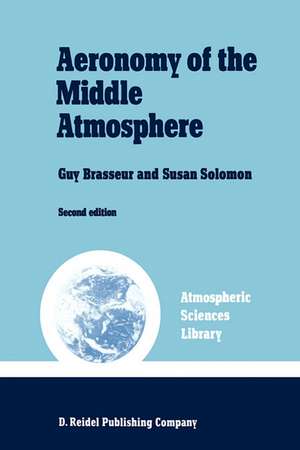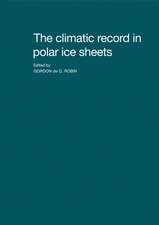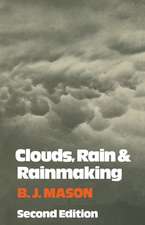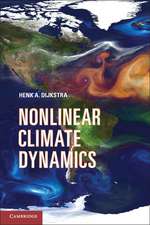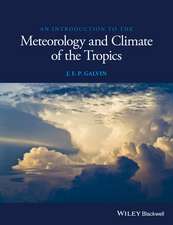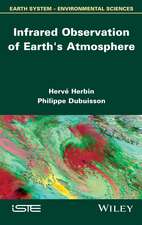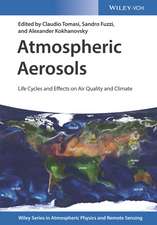Aeronomy of the Middle Atmosphere: Chemistry and Physics of the Stratosphere and Mesosphere: Atmospheric and Oceanographic Sciences Library, cartea 5
Autor G. Brasseur, S. Solomonen Limba Engleză Paperback – 30 oct 1986
Din seria Atmospheric and Oceanographic Sciences Library
- 18%
 Preț: 1996.98 lei
Preț: 1996.98 lei - 18%
 Preț: 957.75 lei
Preț: 957.75 lei - 18%
 Preț: 963.15 lei
Preț: 963.15 lei - 18%
 Preț: 1156.64 lei
Preț: 1156.64 lei - 18%
 Preț: 948.61 lei
Preț: 948.61 lei - 18%
 Preț: 946.55 lei
Preț: 946.55 lei - 18%
 Preț: 1224.18 lei
Preț: 1224.18 lei - 18%
 Preț: 1226.90 lei
Preț: 1226.90 lei - 18%
 Preț: 952.26 lei
Preț: 952.26 lei - 15%
 Preț: 639.90 lei
Preț: 639.90 lei - 18%
 Preț: 1229.58 lei
Preț: 1229.58 lei - 18%
 Preț: 1418.98 lei
Preț: 1418.98 lei - 18%
 Preț: 950.66 lei
Preț: 950.66 lei - 24%
 Preț: 801.40 lei
Preț: 801.40 lei - 18%
 Preț: 1237.30 lei
Preț: 1237.30 lei - 18%
 Preț: 1225.79 lei
Preț: 1225.79 lei - 18%
 Preț: 960.42 lei
Preț: 960.42 lei - 18%
 Preț: 1392.46 lei
Preț: 1392.46 lei - 18%
 Preț: 947.18 lei
Preț: 947.18 lei - 18%
 Preț: 1235.76 lei
Preț: 1235.76 lei - 18%
 Preț: 1541.47 lei
Preț: 1541.47 lei - 18%
 Preț: 1390.59 lei
Preț: 1390.59 lei - 18%
 Preț: 1226.73 lei
Preț: 1226.73 lei - 18%
 Preț: 974.67 lei
Preț: 974.67 lei - 18%
 Preț: 952.40 lei
Preț: 952.40 lei - 18%
 Preț: 954.45 lei
Preț: 954.45 lei -
 Preț: 390.25 lei
Preț: 390.25 lei - 20%
 Preț: 585.98 lei
Preț: 585.98 lei
Preț: 596.84 lei
Preț vechi: 785.32 lei
-24% Nou
Puncte Express: 895
Preț estimativ în valută:
114.24€ • 124.13$ • 96.02£
114.24€ • 124.13$ • 96.02£
Carte tipărită la comandă
Livrare economică 17-23 aprilie
Preluare comenzi: 021 569.72.76
Specificații
ISBN-13: 9789027723444
ISBN-10: 9027723443
Pagini: 472
Ilustrații: 1
Dimensiuni: 155 x 235 x 25 mm
Greutate: 0.65 kg
Ediția:Softcover reprint of the original 1st ed. 1986
Editura: SPRINGER NETHERLANDS
Colecția Springer
Seria Atmospheric and Oceanographic Sciences Library
Locul publicării:Dordrecht, Netherlands
ISBN-10: 9027723443
Pagini: 472
Ilustrații: 1
Dimensiuni: 155 x 235 x 25 mm
Greutate: 0.65 kg
Ediția:Softcover reprint of the original 1st ed. 1986
Editura: SPRINGER NETHERLANDS
Colecția Springer
Seria Atmospheric and Oceanographic Sciences Library
Locul publicării:Dordrecht, Netherlands
Public țintă
ResearchDescriere
The
reader
may
be
surprised
to
learn
that
the
word
"aeronomy"
is
not
found
in
many
of
the
standard
dictionaries
of
the
English
language
(for
exam
ple,
Webster's
International
dictionary).
Yet
the
term
would
appear
to
exist,
as
evidenced
by
the
affiliations
of
the
two
authors
of
this
volume
(Institut
d'
Aeronomie
Spatiale,
Brussels,
Belgium;
Aeronomy
Laboratory,
National
Oceanic
and
Atmospheric
Administration,
Boulder,
CO,
USA).
Perhaps
part
of
this
obscurity
arises
because
aeronomy
is
a
relatively
new
and
evolving
field
of
endeavor,
with
a
history
dating
back
no
farther
than
about
1940.
The
Chambers
dictionary
of
science
and
technology
provides
the
following
defini
tion:
"aeronomy
(Meteor.
).
The
branch
of
science
dealing
with
the
atmo
sphere
of
the
Earth
and
the
other
planets
with
reference
to
their
chemi
cal
composition,
physical
properties,
relative
motion,
and
reactions
to
radiation
from
outer
space"
This
seems
to
us
an
appropriate
description,
and
it
is
reflected
throughout
the
content
of
this
volume.
The
study
of
the
aeronomy
of
the
middle
atmosphere
experienced
rapid
growth
and
development
during
the
1970's
and
1980's,
particularly
due
to
con
cern
over
the
possibility
of
anthropogenic
perturbations
to
the
state
of
the
middle
atmosphere
and
its
protective
ozone
layer.
As
a
result,
much
has
been
learned
regarding
both
the
natural
behavior
of
the
atmosphere
and
the
impact
of
man's
activities
upon
it.
In
this
book
we
shall
attempt
to
describe
the
current
state
of
the
art
as
we
see
it.
Cuprins
1.
The
Middle
Atmosphere
and
Its
Evolution.-
1.1
Introduction.-
1.2
Evolution
of
the
Earth’s
atmosphere.-
1.3
Possible
perturbations.-
References.-
2.
Chemical
Concepts
in
the
Atmosphere.-
2.1
Introduction.-
2.2
Thermodynamic
considerations.-
2.3
Elementary
chemical
kinetics.-
2.3.1
Collision
theory
of
bimolecular
reactions.-
2.3.2
Unimolecular
reactions.-
2.3.3
Termolecular
reactions.-
2.4
Term
symbols
and
their
use.-
2.4.1
General.-
2.4.2
Selection
rules
for
electronic
radiative
processes.-
2.5
Photolysis
processes.-
2.6
Excited
species
in
the
middle
atmosphere.-
References
and
bibliography.-
3.
Structure
and
Dynamics.-
3.1
Introduction.-
3.2
Vertical
structure
and
some
observed
dynamical
characteristics.-
3.3
Fundamental
description
of
atmospheric
dynamics.-
3.3.1
The
primitive
equations.-
3.3.2
The
quasi-geostrophic
potential
vorticity
equation.-
3.4
Effects
of
dynamics
on
chemical
species.-
3.5
General
circulation
models.-
3.6
Dynamics
of
the
stratosphere
in
two
dimensions:
a
conceptual
view.-
3.6.1
Zonal
means
and
eddies.-
3.6.2
Descriptions
of
the
mean
meridional
stratospheric
circulation.-
3.7
The
importance
of
wave
transience
and
dissipation.-
3.8
One
dimensional
representations
of
the
atmosphere.-
References.-
4.
Radiation.-
4.1
Introduction.-
4.2
Solar
radiation
at
the
top
of
the
atmosphere.-
4.2.1
The
sun
as
a
black
body.-
4.2.2
The
observed
solar
spectrum.-
4.3
The
attenuation
of
solar
radiation
in
the
atmosphere.-
4.3.1
Absorption.-
4.3.2
Scattering
by
molecules
and
aerosol
particles.-
4.4
Radiative
transfer.-
4.4.1
General
equations.-
4.4.2
Solution
of
the
equation
of
radiative
transfer
for
wavelengths
less
than
4
µm:
Multiple
scattering.-
4.4.3
Solution
of
the
radiative
transfer
equation
at
wavelengths
longer
than
4
µm:
Absorption
and
emission
of
infrared
radiation.-
4.5
The
thermal
effects
of
radiation.-
4.5.1
Heating
due
to
absorption
of
radiation.-
4.5.2
Cooling
by
radiative
emission.-
4.6
Photochemical
effects
of
radiation.-
4.6.1
General.-
4.6.2
Absorption
cross
sections
of
the
principal
atmospheric
molecules.-
4.6.3
Numerical
calculation
of
photodissociation
coefficients.-
References.-
5.
Composition
and
Chemistry.-
5.1
General.-
5.2
Oxygen
compounds.-
5.2.1
Pure
oxygen
chemistry.-
5.2.2
The
odd
oxygen
family
and
some
observations.-
5.3
Carbon
compounds.-
5.3.1
Methane.-
5.3.2
Methane
oxidation
chemistry.-
5.3.3
Some
end
products
of
methane
oxidation:
carbon
monoxide
and
dioxide.-
5.4
Hydrogen
compounds.-
5.4.1
General.-
5.4.2
Odd
hydrogen
chemistry.-
5.4.3
The
odd
hydrogen
family
and
some
observations.-
5.5
Nitrogen
compounds.-
5.5.1
Sources
of
stratospheric
nitrogen
oxides.-
5.5.2
Chemistry
of
odd
nitrogen
and
nitric
acid
in
the
stratosphere.-
5.5.3
The
odd
nitrogen
family:
lifetimes
and
observations.-
5.5.4
Chemistry
of
odd
nitrogen
in
the
lower
thermosphere
and
mesosphere.-
5.5.5
The
odd
nitrogen
family
in
the
lower
thermosphere
and
mesophere.-
5.6
Chlorine
compounds.-
5.6.1
General.-
5.6.2
Chlorine
chemistry.-
5.6.3
The
odd
chlorine
family:
lifetimes
and
observations.-
5.7
Other
halogens.-
5.8
Sulfur
compounds
and
formation
of
aerosols.-
5.9
Generalized
ozone
balance.-
References.-
6.
The
Ions.-
6.1
Introduction.-
6.2
Formation
of
ions
in
the
middle
atmosphere.-
6.2.1
Effect
of
solar
radiation.-
6.2.2
The
effect
of
energetic
particles.-
6.2.3
Comparison
of
different
ionization
processes.-
6.3
Positive
ion
chemistry.-
6.3.1
Positive
ions
in
the
E
region.-
6.3.2
Positive
ions
in
the
D
region.-
6.3.3
Positive
ions
in
the
stratosphere.-
6.4
Negative
ion
chemistry.-
6.4.1
Negative
ions
in
the
D
region.-
6.4.2
Negative
ions
in
the
stratosphere.-
6.5
Effect
of
ionic
processes
on
neutral
constituents.-
6.6
Radio
waves
in
the
lower
ionosphere.-
References.-
7.
Possible
Perturbations
and
Atmospheric
Responses.-
7.1
Introduction.-
7.2
The
importance
of
coupling
in
the
study
of
perturbations.-
7.3
The
effect
of
changes
in
the
solar
irradiance.-
7.4
Particle
precipitation.-
7.5
Volcanic
emissions.-
7.6
Anthropogenic
emissions.-
7.6.1
Carbon
dioxide.-
7.6.2
Methane.-
7.6.3
Nitrous
oxide.-
7.6.4
Aircraft
in
the
troposphere
and
lower
stratosphere.-
7.6.5
The
chlorofluorocarbons
(CFC’s).-
7.6.6
Simultaneous
perturbations
412.-
References.-
Appendix
A.
Numerical
values
of
physical
constants
and
other
data.-
Appendix
B.
Conversion
factors.-
Appendix
C.
Reaction
rate
constants.-
Appendix
D.
Estimated
mixing
ratio
profiles.
Recenzii
`...
an
important
book
at
the
right
time.
it
is
intended
as
an
introduction
to
the
field
of
middle
atmosphere
chemistry
and
physics
and
as
a
reference
book
for
researchers
in
this
area
as
well.
There
is
no
doubt
that
it
can
and
will
fulfil
both
tasks
very
well...
Rich
and
solid
material
is
presented
for
the
evaluation
of
thermal
and
photochemical
effects
of
radiation...
outstanding
and
stimulating
review...
The
authors
themselves
have
made
numerous
important
contributions
to
this
development,
a
fact
well
reflected
by
the
content
and
quality
of
their
review.'
rBeiträge zur Physik der Atmosphäre, 58:1 (1985)
`... the material is up-to-date, presented in an illustrative manner, and is referenced extremely well.'
Pageoph, 1988
`Aeronomy of the Middle Atmosphereis an interesting and well-written overview of the current status of our knowledge of the composition of the middle atmosphere and the basic radiative, dynamical and photochemical processes which maintain it. I am not aware of another book which addresses the middle atmosphere from such a broad interdisciplinary perspective ... Many atmospheric scientists will wish to add this book to their personal collections.'
Bulletin American Meteorological Society
rBeiträge zur Physik der Atmosphäre, 58:1 (1985)
`... the material is up-to-date, presented in an illustrative manner, and is referenced extremely well.'
Pageoph, 1988
`Aeronomy of the Middle Atmosphereis an interesting and well-written overview of the current status of our knowledge of the composition of the middle atmosphere and the basic radiative, dynamical and photochemical processes which maintain it. I am not aware of another book which addresses the middle atmosphere from such a broad interdisciplinary perspective ... Many atmospheric scientists will wish to add this book to their personal collections.'
Bulletin American Meteorological Society
